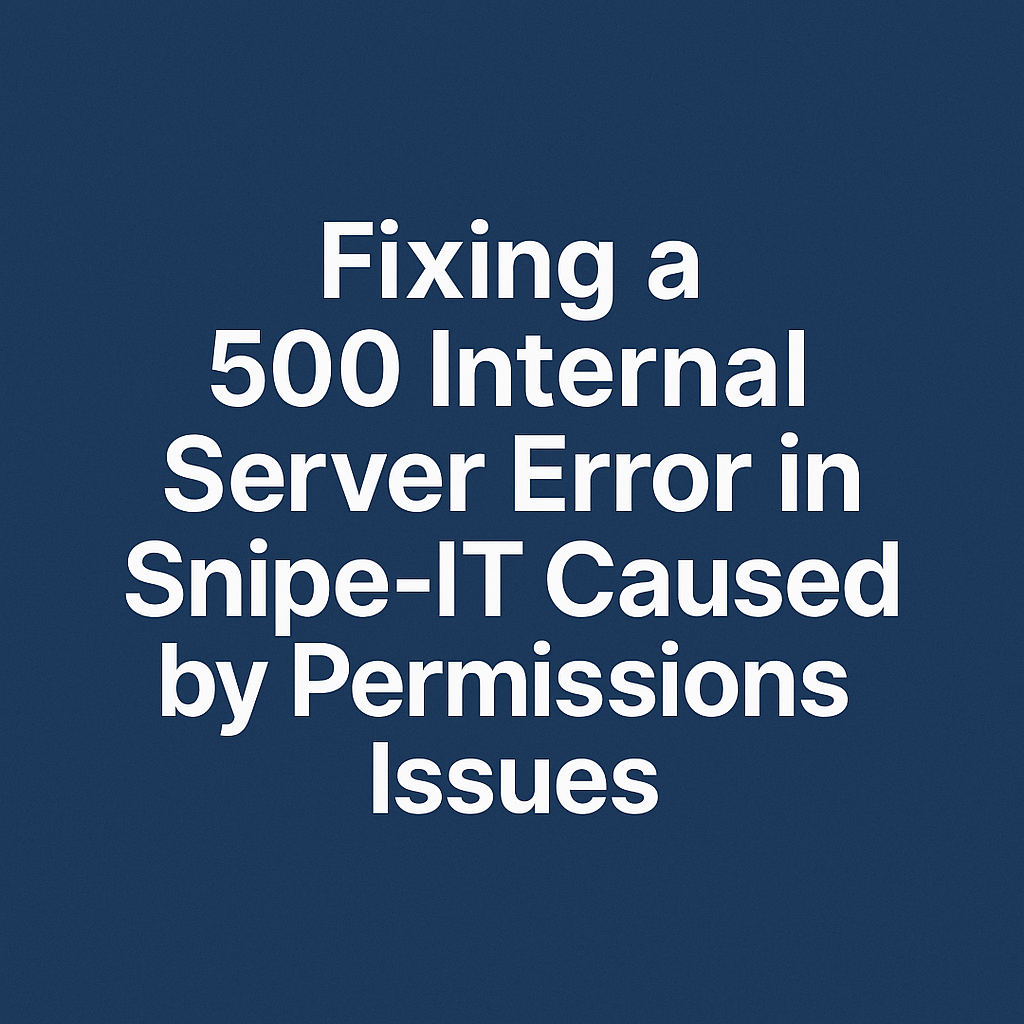If you’re running a self-hosted Snipe-IT instance and suddenly encounter a 500 Internal Server Error, one of the most common causes is incorrect file or directory permissions — especially after restoring from a backup, migrating to a new environment, or using volume mounts with Docker.
Here’s how I resolved this issue in both Docker-based and non-Docker (bare-metal or VM) environments.
🧭 Symptoms
- Snipe-IT displays a 500 Internal Server Error after loading.
- Uploaded logos or files don’t appear in the web interface.
storage/logs/laravel.logshows permission denied or file not found errors.- PHP or Laravel cannot write to required directories.
🛠️ Root Cause
Snipe-IT is built on Laravel, which requires write access to specific directories:
storage/bootstrap/cache/storage/uploads/(accessed viapublic/uploads/via symlink)
If the web server user (typically www-data) can’t read or write to these directories, Snipe-IT crashes with a 500 error.
✅ Fix for Docker-Based Setups
If you're running Snipe-IT via Docker, follow these steps.
Step 1: Fix permissions inside the container
docker exec -it snipeit bash
chown -R www-data:www-data /var/www/html
find /var/www/html -type d -exec chmod 755 {} \;
find /var/www/html -type f -exec chmod 644 {} \;
php artisan storage:link
php artisan config:clear
php artisan config:cache
Step 2: Fix volume permissions on the host
If you’re using a bind mount like:
volumes:
- ./snipeit-data:/var/www/html
Then the container is using your host’s permissions, and fixing them inside the container won’t help. Do this on the host instead:
sudo chown -R www-data:www-data ./snipeit-data
sudo find ./snipeit-data -type d -exec chmod 755 {} \;
sudo find ./snipeit-data -type f -exec chmod 644 {} \;
Restart the container to apply changes:
docker-compose down
docker-compose up -d
✅ Fix for Non-Docker / Traditional Installations
If you're running Snipe-IT on a regular Linux server or VM (Apache or Nginx), use the following steps.
Step 1: Set correct permissions
cd /var/www/snipe-it
sudo chown -R www-data:www-data .
sudo find . -type d -exec chmod 755 {} \;
sudo find . -type f -exec chmod 644 {} \;
Step 2: Recreate storage symlink
php artisan storage:link
Step 3: Clear Laravel config cache
php artisan config:clear
php artisan config:cache
Step 4: Restart the web server
Depending on your setup:
sudo systemctl restart apache2
# or
sudo systemctl restart nginx php8.1-fpm
Make sure you match the correct PHP-FPM version (php7.4-fpm, php8.2-fpm, etc.).
🧪 Still Not Working? Check the Laravel Logs
Use this command to tail the log file:
tail -f storage/logs/laravel.log
Look for errors related to permissions, storage paths, or missing symlinks.
📋 Summary
| Task | Docker-Based | Non-Docker / Bare-Metal |
|---|---|---|
| Fix ownership | On host with chown -R www-data |
On filesystem directly |
| Fix permissions | In container and/or on host | On filesystem directly |
| Create storage symlink | php artisan storage:link |
Same |
| Clear Laravel cache | php artisan config:clear && config:cache |
Same |
| Restart service | docker-compose restart |
systemctl restart apache2 or nginx |
💡 Conclusion
A 500 Internal Server Error in Snipe-IT after a restore or migration is usually caused by Laravel not being able to write to key directories. Whether you're using Docker or hosting directly on a server, correcting file and folder ownership and permissions — and ensuring the storage symlink is in place — is often all it takes to bring your instance back online.
📝 Like this post?
Read more real-world DevOps and self-hosting stories at:
👉 blog.opensourceitsolutions.co.uk
🏷️ Tags
#snipe-it #laravel #500 error #docker #linux permissions #troubleshooting #self-hosted #open-source #devops #sysadmin

